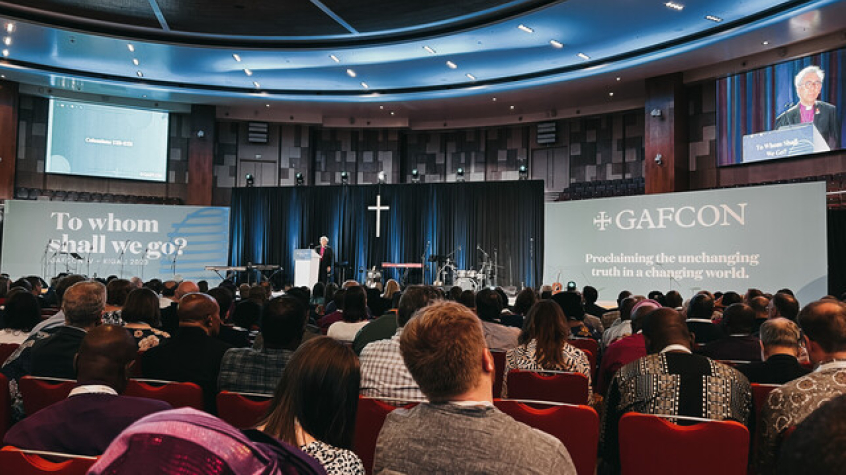
Strong words came out of the Gafcon conference of biblically orthodox Anglicans last week in Kigali, Rwanda. But will the actions of the orthodox Anglican Churches in the global majority be as strong as their words?
The Churches of Nigeria, Rwanda and Uganda, which make up the core of Gafcon, joined with the Global South Fellowship of Anglican Churches (GSFA), which represents about 25 provinces (national or multi-national jurisdictions), in the Kigali Commitment expressing no confidence in Archbishop of Canterbury Justin Welby as the spiritual leader of the Anglican Communion:
"We have no confidence that the Archbishop of Canterbury nor the other Instruments of Communion led by him (the Lambeth Conference, the Anglican Consultative Council and the Primates' Meetings) are able to provide a godly way forward that will be acceptable to those who are committed to the truthfulness, clarity, sufficiency and authority of Scripture.
"The Instruments of Communion have failed to maintain true communion based on the Word of God and shared faith in Christ."
The Kigali Commitment excoriated "successive Archbishops of Canterbury" for failing "to guard the faith by inviting bishops to Lambeth who have embraced or promoted practices contrary to Scripture".
Gafcon and the GSFA joined in expressing disgust with the Church of England's decision at its General Synod in February, with the support of Archbishop Welby, to authorise services of blessing for same-sex couples:
"This failure of church discipline has been compounded by the current Archbishop of Canterbury who has himself welcomed the provision of liturgical resources to bless these practices contrary to Scripture. This renders his leadership role in the Anglican Communion entirely indefensible."
After the Kigali Commitment last Friday, the Archbishop of Canterbury's office at Lambeth Palace issued its own statement.
"We've heard it all before" was its basic message: "We note that The Kigali Commitment issued by GAFCON IV today makes many of the same points that have previously been made about the structures of the Anglican Communion."
Lambeth was able truthfully to point out that at the last plenary meeting of the Anglican Consultative Council (ACC) in Ghana in February, the week after the General Synod vote, 39 out of the 42 Anglican Communion provinces sent delegates. The Archbishop of Canterbury is the president of the ACC.
The Lambeth statement declared: "At the ACC-18 meeting – which was attended by primates (archbishops leading provinces), bishops, clergy and laity from 39 of the 42 Anglican provinces – there was widespread support for working together patiently and constructively to review the Instruments of Communion, so that our differences and disagreements can be held together in unity and fellowship.
"Archbishop Justin Welby has welcomed this decision – just as he also welcomed last year's decision by the Church of England's General Synod to give the Anglican Communion a greater voice on the body that nominates future Archbishops of Canterbury."
The absent Churches were the Gafcon provinces of Nigeria, Rwanda and Uganda which are boycotting the ACC as they did the Archbishop of Canterbury's Lambeth Conference of Anglican archbishops and bishops worldwide last year.
Plenary meetings of the ACC take place about every three years. The next one is due to be hosted by the Church of Ireland in 2026.
If the GSFA provinces send delegates to that plenary meeting, presided over by the Archbishop of Canterbury (almost certainly Welby's successor), they cannot claim to have rejected his (or more likely her) spiritual primacy of the Anglican Communion. With the Church of England eager to show its commitment to diversity, equality and inclusion, the Bishop of Chelmsford, Guli Francis-Dehqani, has a strong chance of becoming the first female and British minority ethnic Archbishop of Canterbury after Welby retires, probably after the King's Coronation.
There would be a cost to the GSFA provinces in impoverished, war-torn countries like Sudan and Myanmar in withdrawing from the ACC and future Lambeth conferences. As former GSFA public relations consultant, Rev Paul Eddy, said in his appeal for orthodox Anglican unity ahead of Kigali: "(For) smaller, more vulnerable provinces, open to attack by civil political forces, or Islam, being part of the Communion has created a level of safety and security."
But unless the orthodox Anglican provinces in the GSFA follow the core Gafcon Churches in refusing to recognise Canterbury's presidency by withdrawing from the ACC, the strongly-worded statement from Kigali could amount to no more than a diatribe.
Julian Mann is a former Church of England vicar, now an evangelical journalist based in Lancashire.













